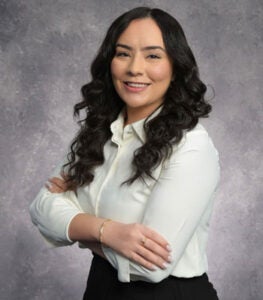 Navigating the transition from student to practitioner is a pivotal moment in every chiropractic student’s journey. For Evelen Aziz, a 12th-quarter student at Palmer Florida from Murfreesboro, Tennessee, this journey has been enriched by her participation in the College’s Department of Defense/Veterans Affairs (DoD/VA) Rotation program.
Navigating the transition from student to practitioner is a pivotal moment in every chiropractic student’s journey. For Evelen Aziz, a 12th-quarter student at Palmer Florida from Murfreesboro, Tennessee, this journey has been enriched by her participation in the College’s Department of Defense/Veterans Affairs (DoD/VA) Rotation program.
Palmer students have the opportunity to gain part of their clinical experience by serving in one of more than 50 DoD/VA student rotation locations. Through these highly-competitive rotations, students work with staff chiropractors in a DoD/VA hospital or clinic, and learn how Doctors of Chiropractic work with medical professionals across many disciplines for the benefit of the patient.
“Palmer prepared me for my rotation in many ways,” Evelen reflected. “Our classes honed my critical thinking and problem-solving skills and allowed us to have hands-on practice early on into the program. Our time in the clinic showed me the importance of patient-centered care, staying ethical and professional. And finally, Palmer offers many electives which I found myself using a lot at the VA such as Flexion-distraction, Activator, and Thompson technique.”
Faculty mentorship played a crucial role in her development and in challenging her to reach her full potential. “I had the privilege of learning from Dr. Ferranti, an amazing faculty clinician who not only challenged and believed in me but also emphasized the significance of proper documentation,” she recalled.
Through exposure to a wide array of complex cases, Evelen gained confidence in her abilities and developed a deeper passion for chiropractic care.
“It has also taught me how to properly communicate and how to work with different health care professionals,” Evelen notes.
For students considering the DoD/VA Rotation program, Evelen offers three pieces of advice.
- Refine your adjustment skills. Take advantage of Palmer’s abundant resources, including technique labs and outreach opportunities.
- Work on your communication skills. Compassion, empathy, and treating patients as individuals goes along way in our profession.
- Stay current on research to provide evidence-based practice informed by the latest scientific findings.
In reference to her first piece of advice, Evelen stated, “Palmer gives us many opportunities to do so – from our great professors who are willing to help in technique labs, to attending TOAL, our time in clinic, to attending outreach. So, even when you’re done with your requirements, continue looking for ways to improve.”
 Navigating the transition from student to practitioner is a pivotal moment in every chiropractic student’s journey. For Evelen Aziz, a 12th-quarter student at Palmer Florida from Murfreesboro, Tennessee, this journey has been enriched by her participation in the College’s Department of Defense/Veterans Affairs (DoD/VA) Rotation program.
Navigating the transition from student to practitioner is a pivotal moment in every chiropractic student’s journey. For Evelen Aziz, a 12th-quarter student at Palmer Florida from Murfreesboro, Tennessee, this journey has been enriched by her participation in the College’s Department of Defense/Veterans Affairs (DoD/VA) Rotation program.